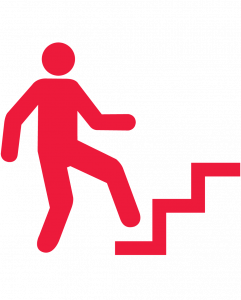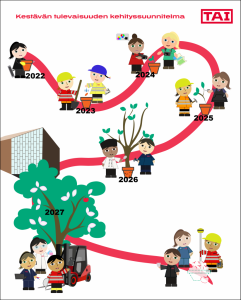TAI’s Sustainable Development Goals
Turku Vocational Institute wants to take sustainable development into account and integrate it better into the institute’s everyday life. TAI has been developing its operating culture for sustainable development in the KESTU – Sustainable Future Professionals project (2022–2023).
The KESTU project created a sustainability plan for TAI. It describes TAI’s sustainability goals and annual actions to achieve them. The goals and actions are described in an interactive presentation that you can open by clicking the adjacent image. The proposal can also be accessed from the responsibility page on the TAI website. By clicking the buttons in the presentation, you can familiarise yourself with each year’s actions and the goals TAI aims to achieve by 2027.
Link to interactive image on ThingLink: https://www.thinglink.com/card/1712797647015773028
TAI’S sustainability goals by theme
Operating culture
- The operating culture has been purposefully adapted in accordance with the sustainability goals
- The sustainable development is managed and steered in a coordinated manner, and sufficient resources are allocated for it
- Sustainable development measures and their effectiveness are monitored regularly and systematically and updated as necessary
- The principles of sustainable development are visible in TAI’s external and internal communications
Teaching and students
- Sustainable development is included in all vocational education and training
- Sustainability teaching is fair and similar for all students
- Students participate in decision-making and planning of measures
Competency of the staff
- The competency of the staff in sustainable development is developed systematically
- It is ensured that all personnel have at least basic competency in sustainability themes
Partnerships
- The educational institution has several sustainable development partners in different fields
- Different fields have sector-specific cooperation with pioneering companies
Carbon wisdom
- The educational institution is aware of its climate impact
- Reasoned measures will be taken to reduce the educational institution’s climate impact
- Energy efficiency, carbon wisdom and the principles of circular economy will be taken into account in the planning of the future TAITO campus
Food
Goals of TAI and the catering services of Education Services:
- Increase the number of students using the catering services
- Increase student participation through food panels and surveys
- Acquire real-time information on the number of students present for the catering services’ use
- Monitor waste on a daily basis and communicate about it to those using the service
- Report the carbon footprint using menu entries and set a target for reducing the carbon footprint
- Increase the use of plant-based food through ‘hybrid recipes’
- Develop the offering of vegetarian food based on student feedback
- Add more fish dishes on the menu of the catering services for students
Transport
Goals:
- Increase the share of those who commute to school or work using muscle power or public transport
- Get a designated parking area for bicycles in each school building with a possibility to use frame locking
- Increase the awareness of the students and staff of the environmental impacts of mobility and different modes of transport and of traffic safety
- Inform the staff and students of the locations of bus stops, bike parking and access routes
- Ensure compliance with traffic rules and improve road safety in the vicinity of school buildings
Energy and water
Goals:
- Reduce energy consumption in school buildings and hence reduce TAI’s carbon footprint through reasoned and cost-effective measures
- Minimise water consumption in school buildings.
- Ensure that the future TAITO campus is energy efficient and has a small carbon footprint
- Use renewable energy sources where possible
- Make students increasingly aware of the significance of energy and water consumption for the environment
Waste management
Goals:
- Minimise the amount of waste generated in teaching
- Sort all waste generated in TAI school buildings and teaching in accordance with the requirements of waste management regulations and legislation
Summary: goals
- TAI has set longer-term and shorter-term goals through which it strives to make its own activities increasingly sustainable.
- The sustainability goals are related to TAI’s operating culture, teaching, personnel, partnerships and carbon wisdom.
- Everyone working and studying at TAI must take sustainability goals into account and act accordingly.

